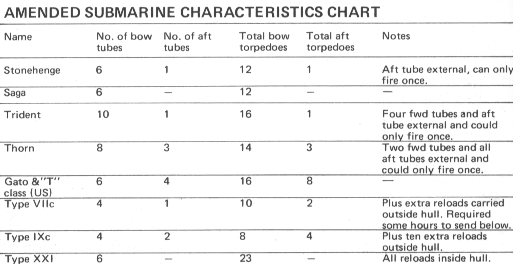Submarine: tactical level submarine warfare: 1939-45
Submarine - some corrections / Bob Aldridge
"Submarine", by Battleline, presents the naval wargamer with something
of a problem. On the one hand it successfully recreates the atmosphere
of WWII submarine warfare. It's game mechanics, although fairly simple,
provide a nice balance between playability and realism. On the other
hand, a fair number of the submarines used in the game have
characteristics that vary a great deal from their historical originals.
Although there are one or two surface ships with the odd thing wrong
with them this article is confined to submarines as being the major
source of historical error in the game.
There are four different nationalities involved, Japanese, American,
British and German. Within the confines of the game system all the
Japanese submarines appear to be historically accurate with respect to
gun armament, number and position of torpedo tubes and number of
torpedoes available for use.
The American submarines fare almost as well, except for the "Thresher"
which is wrongly stated to be of the "Gato" class instead of "T" class.
The gun deck on this boat should be aft of the conning tower instead of
forward. An insignificant fault, unless you are being chased by an enemy
destroyer and one that is easily put right by altering the
bow/broadside/aft gunnery factors from 1-1-0 to 0-1-1. The total number
of torpedoes available, as shown in the Ship Specification Chart, is
incorrect.
Of the British submarines, the two "S" class are correct, but both the
"T" class are completely wrong for torpedo tubes, being quoted as having
six bow and four stern tubes, which is nonsense.
The German U-boats are dreadful. There are supposedly three classes
represented, Types Vllc, IXc and XXi. Not one of the individually
numbered boats is of the correct class, two have the same number and one
of them was actually cancelled before it was built. Furthermore, the
position and number of the torpedo tubes is wrong in most cases.
It is not a difficult job to alter the counters and Ship Specification
Chart to correct these errors and end up with a game that is not only
enjoyable to play but historically accurate as well. To assist others to
do the same, I have drawn up a table of amended submarine
characteristics for those boats in error. A word of warning, though, on
the torpedo reload situation. In the later stages of the war it was not
unknown for German and American sub captains to sneak a couple of extra
shots aboard. Also, there was a tendency for the Germans to omit the
external reloads after 1943 so you can see that the figures are not to
be regarded as infallible but they are near enough.

We now come to the torpedos themselves, the reason for the submarines'
existence.
It is perhaps easy to criticise but not so easy to offer constructive
comments. Accurate information is hard to come by, perhaps the most
easily available source is from "The Devil's Device" by Edwyn Grey. It
looks as though the game designer did not have access to this book when
he compiled the Torpedo Characteristics Chart, as can be seen from the
name given to the sole British type shown, "Whitney Mk.VI". One assumes
that he meant "Whitehead" and even then it ought to be Mark VIII, which
was the standard British torpedo of the war. Disregarding this, the
performance details seem to be all right.
The American types are all correct, as far as can be ascertained. In my
"house rules" I have excluded the Mk.X from the restrictions placed on
US torpedoes prior to 1943 which ought really to apply to the Mk XIV
only.
I have not been able to find out anything about the Japanese torpedoes
but since all their submarine information was in good order I must
assume that the torpedoes are as well.
I don't like the look of the German ones. None of the information in my
possession refers to Mark Nos. All WWII U-boats used 21" tubes, which
excludes the Mk.l and Mk.lX which are shown as 18" and 19" respectively.
If we assume that the Mk.XVI is intended to be the standard German
weapon, the G7e, we ought not to be too far wrong.
The T-5 appears to be perfectly alright. The T5 Mod. likewise seems to
be all right but there seem to be no rules covering its use, it looks as
though we have to make our own.
Maximum safe depths are quoted for the submarines which differ from
official figures. In practice I have found that in an average game a
depth of perhaps 200' is rarely exceeded. If you go too deep it takes
too long to get back up again so for game purposes the figures are quite
acceptable. They are not badly out, anyway.
I would dispute the ability to launch torpedoes at depths of up to 100'.
Granted that in the closing stages of the war the German Type XXI could
do so but I am sure that it was not common practice.
In case this article has given the impression that 'Submarine' is not a
good game I must repeat what I stated earlier. It is a good game as it
stands but suitably corrected it is an accurate game as well and can be
enjoyed the more on that account.
Bibliography
The Ships & Aircraft of the US Fleet, 1945 Edn - James C. Fahey.
Submarine - Commander Edward L.Beach, USN
US Warships of WW2 - Paul H.Silverstone.
Japanese Warships of WW2 - A.J.Watts.
The U-Boat Hunters - A.J.Watts
British Submarines - H.T.Lenton.
German Submarines - H.T.Lenton
The Devil's Device - Edwyn Grey
War Fish - George Grider
